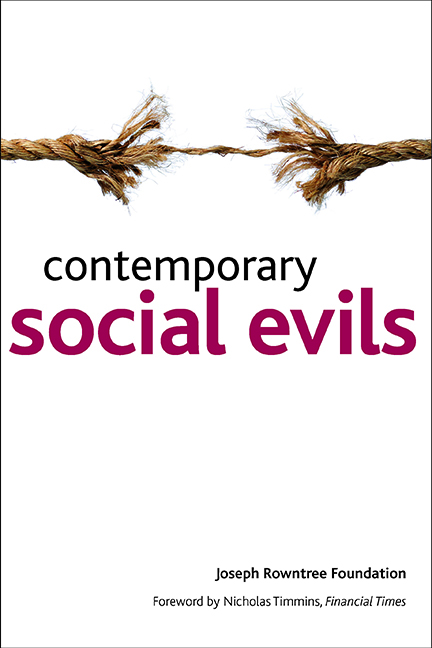Book contents
- Frontmatter
- Contents
- Foreword
- Acknowledgements
- Notes on contributors
- 1 Introduction
- 2 ‘Social evils’ and ‘social problems’ in Britain since 1904
- Section 1 Public Voices
- Section 2 Viewpoints
- A decline of values
- Distrust
- The absence of society
- Individualism
- Inequality
- Section 3 Reflections
- Appendix: How the ‘social evils’ consultations were organised
- Index
17 - The poor and the unequal
Published online by Cambridge University Press: 26 January 2022
- Frontmatter
- Contents
- Foreword
- Acknowledgements
- Notes on contributors
- 1 Introduction
- 2 ‘Social evils’ and ‘social problems’ in Britain since 1904
- Section 1 Public Voices
- Section 2 Viewpoints
- A decline of values
- Distrust
- The absence of society
- Individualism
- Inequality
- Section 3 Reflections
- Appendix: How the ‘social evils’ consultations were organised
- Index
Summary
In India, shortly after a policy of economic liberalisation was introduced in the early 1990s, I attended a seminar conducted by a Westerner who was instructing the government in the mysterious arts of deregulation. He spoke enthusiastically of the ‘creative imbalances’ that would be a prerequisite for development. This was a euphemism for even more gross inequalities than those that have historically disfigured India. The consequences may now be seen, on the one hand, in the suicides of at least 140,000 farmers engulfed by debt; and on the other, in the extravagant palace constructed by Mukesh Ambani in Mumbai – a 27-storey structure with its own helipad, pools, elegant rooms, private theatre and staff of 600.
Meritorious or meretricious?
It is sometimes hard to distinguish between ‘natural’ inequalities, that is to say the unequal distribution of positive human characteristics – intelligence, creativity, beauty or strength of personality – and those that are socially determined – power, wealth or privileged education. Most discussion about ‘equality’ focuses on the latter, since it is virtually impossible to alter natural attributes that favour some people in the world over others.
Attempts to reduce inequality base themselves on raising the life chances of the socially disadvantaged, so, in that tiresome cliché, they can compete on a ‘level playing field’ with more fortunate peers. ‘Equality of opportunity’ is supposed to compensate for all social, educational and cultural handicaps endured by those not born to privilege. This is a shallow and meretricious approach, since the only way in which actual equality of opportunity could be achieved would be by raising everybody to the level of the most advantaged. The idea that ‘education’ can make good all deficiencies is a sentimental, or ideological, fiction.
Establishing ‘equality of opportunity’ is the flimsiest justification for a society that likes to think of itself as rewarding ‘merit’. For its notion of merit is overwhelmingly concentrated on those favoured either by birth or by endowment. In other words, society more or less faithfully reflects profound natural and human-made inequalities. When people rise in what is labelled a meritocracy, the meritorious look with complaisance on the rewards that their ostensible worth bestows on them.
- Type
- Chapter
- Information
- Contemporary Social Evils , pp. 203 - 212Publisher: Bristol University PressPrint publication year: 2009



